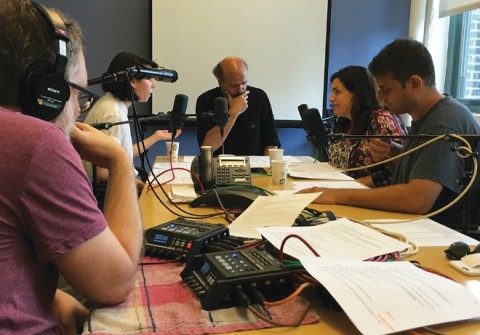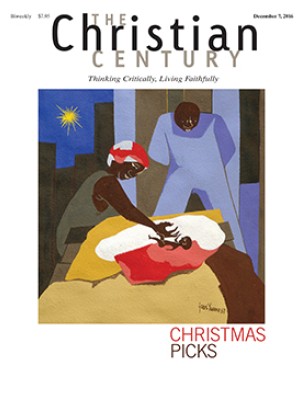A movie in your earbuds
The Truth podcast—with actors' voices, music, and sound effects—is a radio drama for today.

Many podcasts are purely informational—they are about politics, cooking, or culture. Others demand to be experienced, not merely consumed. These are the programs that go deep into human experience and incorporate music and ambient noise to create a comprehensive aesthetic experience.
The Truth is one of my favorites among these podcasts (full disclosure: its producer, Jonathan Mitchell, is a member of my husband’s family). Part of the Radiotopia network, The Truth features “movies for your ears”: fictional stories performed by actors and accompanied by music and sound effects. They are something like Garrison Keillor’s Guy Noir radio dramas on Prairie Home Companion, but less stodgy. And, unlike the Guy Noir dramas, The Truth covers the gamut of human experience and makes use of a variety of genres: comedy, horror, drama, science fiction, and even political thriller. “Santa for President,” commissioned by NPR’s All Things Considered, ran last December just as the primary races were heating up.
Read our latest issue or browse back issues.
The Truth began in 2011 with “Moon Graffiti,” an episode that explored the question: What if Apollo 11 had crashed on the moon instead of landing safely? The episode focused on the claustrophobic drama of Neil Armstrong and Buzz Aldrin as they assessed their grim situation, completed their fact-gathering mission, and marveled at the “magnificent desolation” around them. But the episode spooled out into questions much larger than the fate of two men: What does an America that lost the space race look like? Should concerns about safety supersede our yearning to explore?
I often daydream about quirky Christian communities I’d love to create. A devotional community of runners is a current favorite. But I’d also welcome a Christian gathering that listens to episodes of The Truth and engages its questions in an experience of both formation and transformation.
Many episodes lend themselves to this kind of attention. “Visible” follows a blind character who receives a seeing-eye app that helps him navigate on his own, effectively serving as his vision. But when the gadget assists him in a visit to an art gallery, he bumps up against the limits of artificial intelligence. The Siri-type assistant can’t adequately describe the works of art in front of him. The episode asks us to consider what our relationship will be with technology as our devices get ever “smarter.” It questions the interplay between technology and personhood.
My favorite episode is “Voyager Found,” from 2014, in which two human-like creatures on another planet find the Voyager’s “gold record” after it crashes in their backyard. Their attempt to decipher its contents is delightful, and their response to the various cultural touchstones is touching and hopeful.
Critics tell us that we’re in a golden age of television dramas, with programs like Breaking Bad and the more recent Stranger Things. Podcast fiction offers the added layer of being portable. There’s something particularly gripping about listening to episodes while going about one’s daily business—the juxtaposition becomes part of the experience. I’ll not soon forget navigating the Beltway in Washington, D.C., while listening to “Remember the Baby,” which puts listeners inside a woman’s brain as she succumbs to a stroke. Mitchell often encourages the audience to listen to particular episodes with headphones rather than over speakers for a more immersive experience.
“I want things to sound authentic and realistic,” Mitchell told Backstage last year. “Just like in film, where an actor’s look can convey a character, in audio an actor’s voice is very important. I like things that feel like I’m eavesdropping on someone.” Mission accomplished.
A version of this article appears in the December 7 print edition under the title “Today’s radio dramas.”






